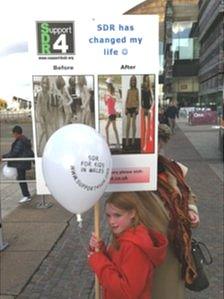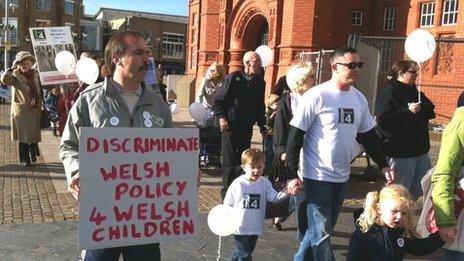Cerebral palsy SDR operation funding protest march to Senedd
- Published

The operation is available on the NHS in England but not in Wales
Parents of children with cerebral palsy have marched to the Senedd to call for funding for a specialist operation which will help youngsters to walk.
The selective dorsal rhizotomy (SDR) operation is available on the NHS in England but not in Wales.
Some Welsh families have raised £40,000 themselves to have SDR in the USA.
The body in Wales responsible for accessing specialist services said there was a lack of clinical evidence to support the procedure.
Some 200 children in the UK have had the surgery since last year when it was introduced, with around 108 going to the United States for it.
Parents and supporters handed in a petition to the Welsh Assembly on Thursday asking for funding to be provided for the operation, which involves identifying and cutting the spinal nerves causing stiffness and pain.
One of the organisers of the march, Sue Hurrell from Cardiff, said her seven-year-old daughter Imogen underwent the operation in the USA earlier this year and was making "tremendous progress".
She said: "In America the main surgeon over there has been doing the surgery for 25 years.
"In more recent years, the technique has been refined to make it more suitable for a wider range of children and to eliminate some of the side effects and problems that may have occurred with some patients from the earlier days.
"Oddly enough in the UK, we're kind of behind the rest of the world in embracing this medical procedure so really it's only been available in an old fashioned form in Oswestry for some time but we've had to travel to America for the surgery.
"There is now a surgeon who has done around 30 children based in Bristol but all the families from Wales, even those that have been to Bristol, have not had any funding for that provided by the NHS."
She said the surgery offered a long-term solution to help children like Imogen and had dramatically improved her daughter's life.
"My daughter is at the more extreme end of a child that would benefit from the surgery," she said.
'Free of disability'
"She does have spasticity in her upper body too and yet she's defied everyone's expectations and is doing far better.
"She's gone from only being able to sit up unsupported to now being able to stand tall with her friends and walk across the playground in her walking frame which we never would have believed would have happened so soon."
She said there was also a strong argument that the procedure would help save the NHS money in the long run.

Sue Hurrell's daughter Imogen (centre) is making 'tremendous progress' after her operation
"Some children have gone from being on walking frames or walking with a very awkward gait to being almost completely free of disability and having their benefits reduced as a result of that. This would be true for them for life," she said.
"Children even with quite minor spasticity only in their legs who can walk... can end up in wheelchairs as they get older so the costs are phenomenal, so there will be a massive saving to the NHS with this procedure."
The Welsh Health Specialised Services Committee, which is responsible for access to specialised services in Wales, said the policy for SDR had been considered in January this year.
"Following a review of the evidence and after seeking advice from the relevant local specialists, the committee concluded that there is lack of clinical evidence at this time to support SDR," said a spokesperson.
"This is consistent with the National Institute of Clinical Excellence's view that further research into this procedure and measurement of long-term outcomes is encouraged.
"Therefore SDR is not generally supported for Welsh patients.
"However, if the clinician considers there are exceptional circumstances for funding the procedure for a specific patient, this would be considered under the all-Wales policy on making individual patient funding requests".

The operation is available on the NHS in England but not in Wales
- Published28 February 2012
- Published20 June 2011
- Published26 May 2011